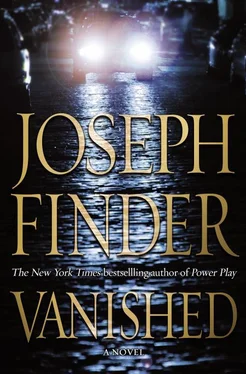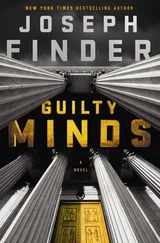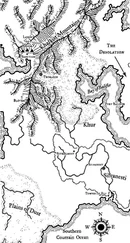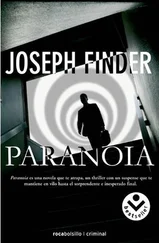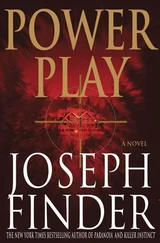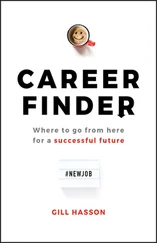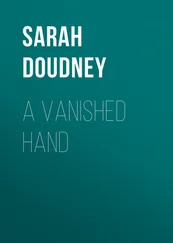After I passed through a second metal cage, I turned to the guard who was scanning my pass with a barcode reader and said, “Pretty high-tech.”
The guard, a bored-looking, obese black guy with sad eyes and a wide mouth, nodded.
“Big old scary building like this, I was expecting, you know, one of those huge ledgers and a quill, right?”
He broke out laughing. It obviously took very little to amuse him.
“Hey, so I guess that means you keep track of every visitor in your computer.”
“Oh yeah.”
“Anyone can see I visited?”
“Not unless they have access to the computer,” he said.
I nodded. “Okay.”
“You visiting Victor Heller?”
“Right.”
“Who’s that, your brother?”
“Father.”
“Father, huh? Been inside a long time?”
“A while.”
“Guess you got scared straight, right?”
“You could say that.”
THE VISITORS’ room looked like the cafeteria in my high school-the same molded-plastic chairs, the same greenish linoleum floor, the same high ceiling with stained white drop-in panels. The same smell of ammonia mixed with human sweat and desperation. A long, undulating counter snaked through the room, bisecting it: prisoners on one side, visitors on the other. On the visitors’ side, a cheery mural was painted on the wall, primitive art depicting the countryside, probably done by inmates. There were maybe half a dozen visitors. A couple of little kids were running around, oblivious to the setting. Only three prisoners.
Sitting at the far end of the counter was my father.
In the twelve years since I’d last seen him, I’d aged, of course. But he seemed to have aged at the speed of light. Victor Heller, the Dark Prince of Wall Street, was an old man. His shoulders were stooped. He had a big white beard and looked like an Old Testament prophet. His eyebrows were heavy and unruly, like steel-wool pads that had seen too much use. He was wearing a dark green shirt and matching pants, his prison outfit, which looked like a janitor’s uniform.
He looked up as I approached. His eyes were rheumy, and he looked lost. His chronic psoriasis had gotten much worse since I’d last seen him: large flakes of skin were coming off his cheeks and forehead. He reminded me of a molting reptile, a snake shedding its skin, as if the scales were falling away to reveal his corrupt inner core.
But then he smiled when he saw me, and the old familiar glint was in his eyes.
He waited for me to sit down, adjust my chair, the legs scraping against the linoleum. Then he said, “They must have told you.”
“Told me what?” I said.
“About the cancer.”
“The cancer,” I repeated, then I understood. The reason he and Roger had spoken five times. But why hadn’t Roger said anything to me, or at least to Lauren? Why hadn’t my mother called to tell me the news? The old man was dying. Suddenly, I felt hollow.
I looked down. “Dad, I-my God, I had-”
He was laughing raucously, his head thrown back. His beard extended down his neck. That hollow place inside me filled slowly with something ice-cold.
“Why else would you lay down your arms and come visit your poor old Dad?” he said, his words half-choked by laughter. “No, I’m not dying. But there’s gotta be one hell of a reason why you’re here. I figured you must know something they’re not telling me.”
“No, Dad, I don’t.”
“You’ve never been here before, have you?”
I shook my head.
“Of course you haven’t. The day I reported, Roger drove me. Your mother was quite ill.”
“She was too depressed to get out of bed.”
“Yes, that’s right. And you-you had a study to finish at McKinsey, was that it?”
“I’d enlisted by then.”
“Ah, yes. The few. The proud. Nick Heller.”
“It was the army, not the marines. Special Forces.”
“Special,” he said. He rolled the word around in his mouth like the first sip of a Château Lafite. His lips curled at the edges. “Hooah.”
The day he entered prison, Dad gave Roger his most prized possession, a gold Patek Philippe watch that Mom had given him when he made his first hundred million. Inscribed on the back was a line from Virgil in Latin: Audentes fortuna juvat . Fortune favors the bold. He’d been bold all right, but Fortune hadn’t gotten the memo.
“So to what do I owe the honor of your presence?”
“I want to know what Roger’s been talking to you about.”
His eyes went blank. “What’s he been talking to me about? What do sons talk about with their fathers?” A slow, mirthless smile. “Been so long, you’ve probably forgotten.”
One of the inmates down the row was arguing with his visitor, a young black woman who appeared to be the mother of the two little kids running around. Maybe he was the father. I wondered whether the prisoners were allowed conjugal visits.
“He’s been in touch with you a lot recently.”
“He calls his dad. He worries about me. He sends me packages. Your mother sends me packages. Everyone else does.” He cocked his head, raised his heavy brows, looked at me through drooping lids. “Maybe it’s a financial hardship?”
Of course, I knew that Roger hadn’t actually called Dad. Incoming calls weren’t allowed. Dad had to place collect calls to Roger.
“Roger’s come to visit you, too.” The nav system in his Mercedes confirmed it.
“They allow visitors between seven thirty and three. They encourage visits, in fact. They say visits can be a positive influence, you know that? They say inmates who receive regular visits adjust much better once they’re released from prison. Which, in my case, is a mere eighteen years from now. When I’ll be, assuming I’m still alive-”
“Why?”
“Why does he visit me? Maybe because he’s concerned. Silly, I know. An old man like me locked up with rapists and child molesters and perverts-what’s to worry about?”
“I mean, why so often?”
“Often? That’s a relative concept when you’re in here.” He licked his lips. They were chapped, startlingly red against the snow white of his Methuselah beard.
I tried again, came at it head-on. “When did you last see him?”
He frowned, folded his arms, leaned back. “I haven’t seen your brother in, well, easily a year.” He looked up and to his right. One of the telltale indicators that he was lying. Another one, some might say, was when he moved his lips. “Roger’s got a family and a serious career. It’s not so convenient-”
“He was here last week,” I said.
He slowly shook his head. “I think I’d remember that, Nicholas. There’s not much to do here if you don’t lift weights, and you’ve seen all the Law and Order reruns.”
“Roger’s name is in the prison visitor-control system three times in the last ten weeks.”
He hesitated only a split second while he decided whether to brazen it out. His smile spread slowly, eyes gleaming.
“You know me too well,” he said with a laugh.
The summer before Roger went off to Harvard, we were hanging out in the body shop of Norman Lang Motors, the used-car dealership owned by a buddy of mine.
Timmy Lang was watching a guy spray-paint an orange-and-yellow flaming pony on the side of a red Mustang. The paint fumes smelled bad, and we’d always thought that Timmy, not the brightest bulb, had probably breathed too much of them over the years, so Roger and I were standing as far away as we could get. I was going on about how unfair it was, what they’d done to Dad. The way he’d had to go on the lam, become a fugitive somewhere in Switzerland, and all because he’d made some powerful enemies. He was innocent: He’d told us so himself.
Читать дальше
